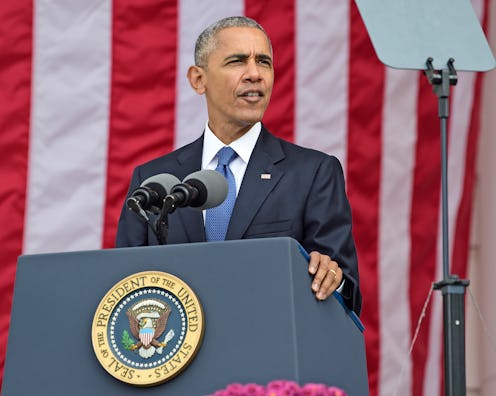News
Obama Casts Shade On Hillary Clinton's Ground Game
In his first press conference since Americans elected Donald Trump to serve as his successor, President Barack Obama seemed to levy some criticism at Hillary Clinton and her campaign, contrasting his sweeping victories in 2008 and 2012 with this year's shocking upset. Although his comments were restrained, Obama implied that Clinton didn't spend enough time and energy winning over white, working-class voters in crucial swing states like Iowa. Speaking to the White House press corps Monday, Obama kept his remarks diplomatic, but there was a crucial subtext that suggested the outgoing president is preparing to be more vocally opinionated once he leaves office.
The president's latest remarks at the White House add fuel to speculation ignited by a wide-ranging interview with Vanity Fair where Obama said he is looking forward to life outside the Oval Office, since he will be able to speak more freely, and "move the ball down the field on the issues that I care most deeply about."
Obama's comments at the White House also mark the most direct (if still veiled) critique the president has offered to his fellow Democrats since the massive Republican victory that took place on Nov. 8. Rejecting the conclusion that Trump's victory was fueled by demographics, Obama pointed out that he won Iowa (twice) because he spent at least 87 days meeting voters in that state.
When asked by reporters what he thought "went wrong" for Democrats this election, the president demurred, saying the American people had made clear they want to hear new voices in their democracy. "I think it's important for me not to be big-footing that conversation,” Obama said, according to NPR reporter Brakkton Booker. “I think we want to see new voices.”
“I think it's a healthy thing for the Democratic Party to go through some reflection,” Obama added. The president also noted that voter turnout was once again dismal in this election, with an estimated 43 percent of eligible voters deciding not to vote.
It's worth noting that, while Trump and the Republican party in general enjoyed a substantial victory in the Electoral College, Clinton won the popular vote. But as Obama indicated, the Clinton campaign's ground game focused on major cities, which tend to lean more liberal. The New York Times explained that across the country, Trump dominated rural areas, while Clinton carried metropolitan areas, even in states that ultimately voted for Trump.
As Bustle's Jon Hecht explained on Nov. 9, "In the United States, there are far more people in the cities than out in the country. If this election was defined by one split, more than rich-poor, white-minority, young-old, or men-women, it was defined by the split between urban and rural America."
If equality-minded Americans are looking for ways to move forward after the stunning election of Trump — a candidate with no experience in elected office who was endorsed by proud white supremacists — perhaps we should start by reaching outside our echo chambers and listening to those Trump supporters whose valid fears put a demagogue in the White House.
